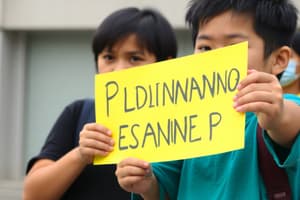Podcast
Questions and Answers
Which situation exemplifies Jus Sanguinis, the principle of citizenship adhered to in the Philippines?
Which situation exemplifies Jus Sanguinis, the principle of citizenship adhered to in the Philippines?
- A naturalized Filipino citizen giving birth in Spain.
- A child born in the Philippines to American parents.
- A child born in America to Filipino parents.
- A child born in the Philippines to Indian parents. (correct)
Which of the following actions would qualify a Filipino citizen to potentially lose their citizenship, according to the provided content?
Which of the following actions would qualify a Filipino citizen to potentially lose their citizenship, according to the provided content?
- Volunteering in a local community project.
- Becoming a naturalized citizen of another country. (correct)
- Attending a foreign university for higher education.
- Marrying a foreigner from Germany.
The Citizenship Retention and Reacquisition Act of 2003 (RA 9225) primarily addresses the concerns of which group?
The Citizenship Retention and Reacquisition Act of 2003 (RA 9225) primarily addresses the concerns of which group?
- Foreign investors seeking permanent residency in the Philippines.
- Filipinos seeking asylum in foreign countries due to persecution.
- Dual citizens renouncing their Filipino citizenship.
- Natural-born Filipinos who have become citizens of another country. (correct)
Which action best demonstrates 'active citizenship' as described?
Which action best demonstrates 'active citizenship' as described?
Which scenario illustrates a violation of legal rights, according to the principles outlined?
Which scenario illustrates a violation of legal rights, according to the principles outlined?
How do economic rights contribute to the broader concept of human rights?
How do economic rights contribute to the broader concept of human rights?
Which of the following characteristics distinguishes human rights from other types of rights?
Which of the following characteristics distinguishes human rights from other types of rights?
How does the concept of 'limited' apply to human rights?
How does the concept of 'limited' apply to human rights?
What was the primary goal of the First Geneva Convention in 1864?
What was the primary goal of the First Geneva Convention in 1864?
What is the role of media in public governance, according to the content?
What is the role of media in public governance, according to the content?
Flashcards
Citizenship
Citizenship
The relationship between an individual and a state, involving rights and responsibilities.
Jus Sanguinis
Jus Sanguinis
Based on bloodline; citizenship is inherited from parents.
Jus Soli
Jus Soli
Based on place of birth; citizenship is determined by where someone is born.
Naturalization
Naturalization
Signup and view all the flashcards
Repatriation
Repatriation
Signup and view all the flashcards
Citizenship Retention and Reacquisition Act of 2003
Citizenship Retention and Reacquisition Act of 2003
Signup and view all the flashcards
Active Citizen
Active Citizen
Signup and view all the flashcards
Human rights
Human rights
Signup and view all the flashcards
Legal rights
Legal rights
Signup and view all the flashcards
Essential Property of Human Rights
Essential Property of Human Rights
Signup and view all the flashcards
Study Notes
- Study notes on pagkamamamayan (citizenship) with Tagalog text.
Konsepto at Katuturan (Concept and Meaning)
- Pagkamamamayan or citizenship signifies the relationship of an individual to a state.
- It denotes membership in a state where the individual enjoys rights and performs duties as a citizen.
Ang Mamamayang Pilipino (The Filipino Citizen)
- The 1987 Constitution, Article IV, Sections 1-5, specifies who are considered citizens of the Philippines.
- Citizens of the Philippines include:
- Those who were citizens at the time of the adoption of the Constitution.
- Those whose mothers or fathers are citizens of the Philippines.
- Those born before January 17, 1973, to a Filipino mother, who chose Filipino citizenship upon reaching the age of majority.
- Those who became citizens according to the law.
- Natural-born citizens are citizens of the Philippines from birth.
- They do not need any further action to acquire or perfect their citizenship.
- Filipino citizenship may be lost or reacquired as provided by law.
- Filipino citizens who marry foreigners retain their citizenship.
- Unless by their own action or omission, they are deemed to have renounced it under the law.
- Dual allegiance is against national interest and should be dealt with by law.
Mga Prinsipyo ng Pagkamamamayang Pilipino (Principles of Filipino Citizenship)
There are two principles of citizenship followed in the Philippines:
- Jus Sanguinis: Citizenship is determined by blood or the citizenship of the parents.
- This is the principle followed in the Philippines.
- Jus Soli: Citizenship is based on the place of birth, regardless of the parents' citizenship.
- This is the principle followed in America.
- According to Section 3 of the Constitution, citizenship can be lost but may be regained.
Valid reasons for loss of Filipino citizenship include:
- Naturalization in another country.
- Expatriation or voluntary renunciation of citizenship.
- Taking an oath of allegiance to a foreign country.
- Serving in the armed forces of a foreign country.
- Marriage to a foreigner and acquiring his citizenship.
Paano Maibabalik ang Pagka-Pilipino? (How to Regain Filipino Citizenship?)
Lost citizenship can be regained through:
- Naturalization: Accepting a foreigner and granting them the rights of citizens, through court or Congressional decree.
- Repatriation: Voluntarily returning to one's country of origin.
- Action of Congress: Responding to an application to become a Filipino citizen.
- Government pardon: For those who deserted the armed forces.
- Citizenship Retention and Reacquisition Act of 2003 (RA 9225): Natural-born citizens who become citizens of another country through naturalization do not lose their Filipino citizenship.
- Went into effect on September 17, 2003, and is commonly known as the Dual Citizenship Act.
Active Citizen
- Refers to citizens who participate in broad issues and activities aimed at promoting and supporting democracy.
- A patriotic citizen is one who is:
- Pro-Nationalist
- Loyal to the country
- Ready to defend the state
Karapatang Pantao (Human Right)
- Rights/karapatan are important that constitute the social life of every individual.
- Deprivation of rights limits individual self-development and societal contribution.
- Individual rights and their recognition foster development and effective social service.
Karapatang Pantao (Human Rights)
- Rights are important factors in social life.
- Deprivation hinders personal development and social contribution.
- Recognition of rights promotes personal and communal progress.
Natural Rights
- Natural rights are inherent to human beings.
- Some scholars believe humans receive such rights from nature.
Legal Rights
- Legal rights are recognized and enforced by the state.
- Violation results in legal penalties enforced by state institutions.
Three Categories of Legal Rights
- Civil Rights: Rights providing opportunities for citizens to live well in society.
- Political Rights: Rights enabling participation in political processes.
- Economic Rights: Provide economic security.
Konsepto at Kahalagahan ng Pagsusulong ng Karapatang Pantao (Concept and Importance of Promoting Human Rights)
- Human rights are inherent due to being human.
- They are the highest form of moral rights.
- People possess these regardless of discrimination based on race, gender, sexuality, ethnicity, language, religion, age, socio-economic status, etc.
Mga Pangunahing Katangian ng Karapatang Pantao (Key Characteristics of Human Rights)
- Inalienable: Inherent regardless of condition or status, lasting until death.
- Essential: Necessary for moral, physical, social well-being.
- Humane: Treating others with dignity.
- Irrevocable: Cannot be taken away.
- Universal: Non-discriminatory.
- Limited: Restricted to prevent infringing on others' rights.
- Dynamic: Evolving with socio-political changes.
- Limits to State Power: Preventing government abuse, especially regarding freedoms.
Kahalagahan ng Pagtataguyod sa Karapatang Pantao (Importance of Upholding Human Rights)
- Citizens live freely and safely.
- Promotes peace as everyone respects each other's rights.
- Equal opportunities for self-improvement, leading to national progress.
Kaunlarang Pambansa (National Development)
- Stability in social, economic, and political realms.
Kasaysayan ng Karapatang Pantao: Dokumentong Naglalahad ng mga Karapatang Pantao (History of Human Rights: Documents Expressing Human Rights)
- 539 B.C.E.: Cyrus Cylinder in Babylon, considered the "world's first charter of human rights."
- 1215: Magna Carta in England, addressing rights of widows, due process, and equality before the law.
- 1628: Petition of Right by the English Parliament.
- American Declaration of Independence (1776).
- 1787: U.S. Constitution, including the Bill of Rights (1791).
- 1789: French Revolution and the Declaration of the Rights of Man and of the Citizen.
- First Geneva Convention (1864).
- Universal Declaration of Human Rights (1948): Established by the UN.
- UDHR approved on December 10, 1948, called "International Magna Carta for all Mankind."
Mga Karaniwang Anyo at Epekto ng Paglabag sa Karapatang Pantao (Common Forms and Effects of Human Rights Violations)
- Forms: Genocide, rape, forced sterilization, medical experiments, slavery, honor killings, starvation, unjust arrest, extrajudicial killing.
- Effects: Psychological distress, hindered personal development, insecurity, disrupted commerce, distrust in government, disregard for the "rule of law", international pressure.
Mga Artikulo ng UDHR (Universal Declaration of Human Rights)
- Everyone is born free and equal in dignity and rights.
- Rights are guaranteed to all, without discrimination.
- Right to life, liberty, and personal security.
- Freedom from slavery and servitude.
- Freedom from torture or cruel treatment.
- Recognition as a person before the law.
- Equal protection under the law.
- Right to seek justice for violations of rights.
- Freedom from arbitrary arrest or exile.
- Right to a fair and public trial.
- Presumption of innocence until proven guilty.
- Protection from arbitrary interference in privacy, family, or home.
- Freedom of movement and residence.
- Right to seek asylum from persecution.
- Right to a nationality.
- Freedom to marry and start a family.
- Right to own property.
- Freedom of thought, conscience, and religion.
- Freedom of opinion and expression.
- Right to peaceful assembly and association.
- Right to participate in government and elections.
- Right to social security.
- Right to work, equal pay, and favorable working conditions.
- Right to rest and leisure.
- Right to an adequate standard of living, including health and well-being.
- Right to education.
- Right to freely participate in cultural and scientific life.
- Right to a social and international order ensuring rights.
- Responsibilities to the community and limits to rights for the common good.
- No one may act in a way that destroys these rights and freedoms.
Saligang Batas ng Pilipinas ng 1987 (Philippine Constitution of 1987)
- Article II: Declaration of Principles and State Policies.
- Article III: Bill of Rights.
Politikal at Pansibikong Pakikilahok (Political and Civic Participation)
- Political participation involves activities related to governance.
Mga Paraan ng Pakikilahok (Ways of Participation)
- Malayang Pamamahayag at Mapayapang Pagtitipon (Freedom of Expression and Peaceful Assembly): Guaranteed by the 1987 Constitution.
- Media serves to inform, influence, and convey public sentiment.
- Pagboto (Voting): Exercising the right to elect representatives; various types including:
- Eleksyon (Election): Formal selection of officials.
- Plebesito (Plebiscite): Approval or rejection of a proposal.
- Recall: Removing an elected official.
- Initiative: Proposing laws.
- Referendum: Voting on social issues.
- Qualified voters include Filipino citizens who are at least 18 years old.
- Disqualified voters include those convicted of crimes with imprisonment of at least one year.
Pagsali at pagsuporta sa mga Organisasyong pampolitika (Participation in Political Organizations)
- Partido Politika (Political Parties): Aim to maintain power and unite people.
Katangian ng Partido Politikal (Characteristics of Political Parties)
- Aim to control power, based on shared ideology, formal structure, and supporters.
Mga Dahilan kung Bakit Naitatag ang mga Partido Politikal (Reasons for Establishing Political Parties)
- Unite those with similar views, provide information to voters, encourage participation, train new leaders.
Ilan sa mga Partido Politikal sa Pilipinas (Some Political Parties in the Philippines)
- Nacionalista Party (NP), Partido Liberal (LP), National Unity Party, United National Alliance (UNA), Lakas-Christian Muslim Democrats, Puwersa ng Masang Pilipino, Nationalist People's Coalition, Laban ng Demokratikong Pilipino.
Pansektor na mga Kinatawan o Party List (Sectoral Representatives or Party List)
- Representation for marginalized sectors in Congress.
- RA 7941 (Party List System): Allows organized groups to participate in national politics.
Ilan sa mga Party List (Some Party Lists)
- Bayan Muna, Citizens' Battle Against Corruption, Ako Bicol, Ang Probinsyano, Akbayan, Gabriela, ACT Teachers, Kabataan, 1PACMAN, ACT-CIS.
Paglahok sa Civil Society (Participation in Civil Society)
- Exercising the right to participate in various organizations.
- Civil society groups convey citizen needs to the government.
- Includes NGOs and non-profit organizations.
Non-Governmental Organization (NGO)
- A group of citizens whose goal is to help people.
- They provide free service and assistance to people to bring their complaints to the government.
People's Organization
- Type of organizations belonging to civil society
- Composed of citizens directly affected by the problems
Studying That Suits You
Use AI to generate personalized quizzes and flashcards to suit your learning preferences.




